英语中的比较级
- 格式:doc
- 大小:44.50 KB
- 文档页数:15
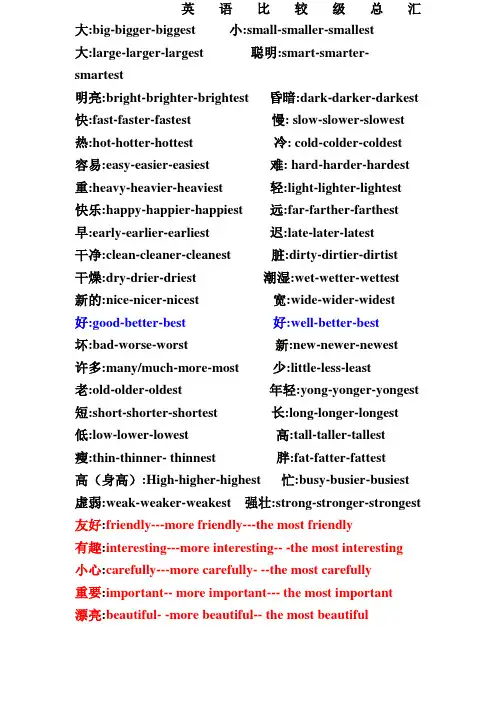
英语比较级总汇大:big-bigger-biggest 小:small-smaller-smallest大:large-larger-largest 聪明:smart-smarter- smartest明亮:bright-brighter-brightest 昏暗:dark-darker-darkest 快:fast-faster-fastest 慢: slow-slower-slowest 热:hot-hotter-hottest 冷: cold-colder-coldest容易:easy-easier-easiest 难: hard-harder-hardest 重:heavy-heavier-heaviest 轻:light-lighter-lightest快乐:happy-happier-happiest 远:far-farther-farthest 早:early-earlier-earliest 迟:late-later-latest干净:clean-cleaner-cleanest 脏:dirty-dirtier-dirtist干燥:dry-drier-driest 潮湿:wet-wetter-wettest新的:nice-nicer-nicest 宽:wide-wider-widest 好:good-better-best 好:well-better-best坏:bad-worse-worst 新:new-newer-newest许多:many/much-more-most 少:little-less-least老:old-older-oldest 年轻:yong-yonger-yongest 短:short-shorter-shortest 长:long-longer-longest 低:low-lower-lowest 高:tall-taller-tallest瘦:thin-thinner- thinnest 胖:fat-fatter-fattest高(身高):High-higher-highest 忙:busy-busier-busiest 虚弱:weak-weaker-weakest 强壮:strong-stronger-strongest 友好:friendly---more friendly---the most friendly有趣:interesting---more interesting-- -the most interesting小心:carefully---more carefully- --the most carefully重要:important-- more important--- the most important漂亮:beautiful- -more beautiful-- the most beautiful。
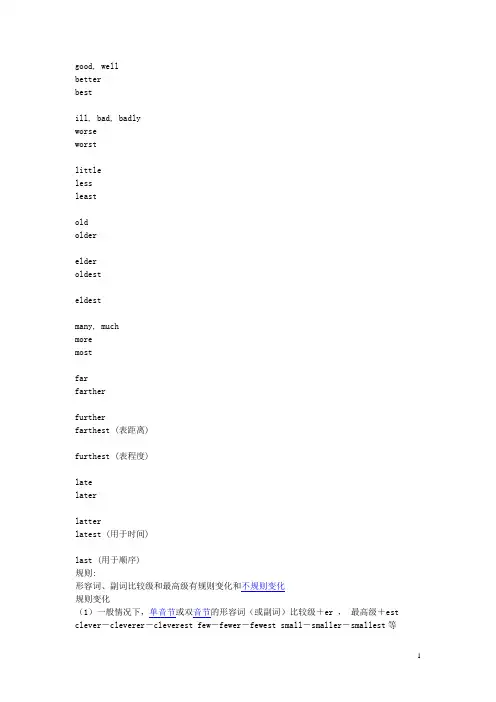
good, wellbetterbestill, bad, badlyworseworstlittlelessleastoldolderelderoldesteldestmany, muchmoremostfarfartherfurtherfarthest (表距离)furthest (表程度)latelaterlatterlatest (用于时间)last (用于顺序)规则:形容词、副词比较级和最高级有规则变化和不规则变化规则变化(1)一般情况下,单音节或双音节的形容词(或副词)比较级+er ,最高级+est clever-cleverer-cleverest few-fewer-fewest small-smaller-smallest等(2)以e结尾的词,比较级+r,最高级+st即可nice-nicer-nicestcute-cuter-cutestlarge-larger-largest(3)以辅音字母+y结尾的变y为i+er或esteasy-easier-easiesthappy-happier-happiest再如:early , busy , heavy , dirty , lazy . 也如此(4)双写最后一个辅音字母+er或est的词同学要用心去记。
1. fat-fatter-fattest2. thin-thinner-thinnest3. hot-hotter-hottest4. red-redder-reddest5. wet-wetter-wettest6. big-bigger-biggest(5)多音节和部分双音节的词需要在形容词原级前+more构成比较级,+the most构成最高级。
beautiful -more beautiful - the most beautiful .delicious , popular , important ,interesting , expensive双音节的词如careful-more careful -the most carefuluseful -more useful -the most useful .少数单音节词也是这样如:pleased-more pleased -the most pleasedtired-more tried -the most tiredB本文是由郑州雅思培训学校整理而成,如需转载请注明出处: 。
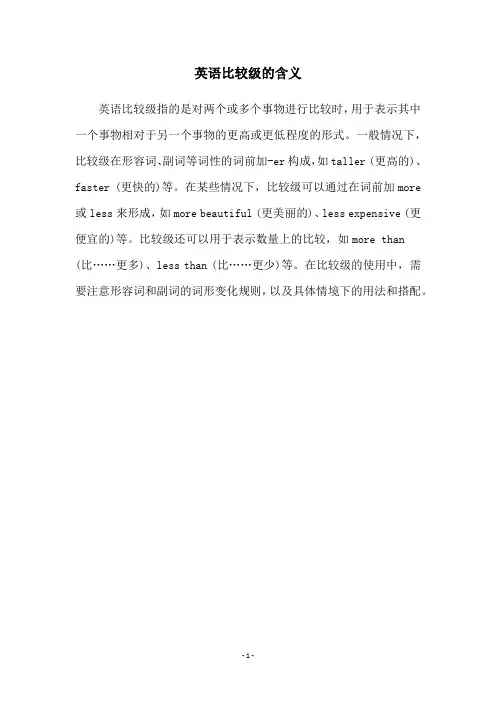
英语比较级的含义
英语比较级指的是对两个或多个事物进行比较时,用于表示其中一个事物相对于另一个事物的更高或更低程度的形式。
一般情况下,比较级在形容词、副词等词性的词前加-er构成,如taller (更高的)、faster (更快的)等。
在某些情况下,比较级可以通过在词前加more 或less来形成,如more beautiful (更美丽的)、less expensive (更便宜的)等。
比较级还可以用于表示数量上的比较,如more than (比……更多)、less than (比……更少)等。
在比较级的使用中,需要注意形容词和副词的词形变化规则,以及具体情境下的用法和搭配。
- 1 -。
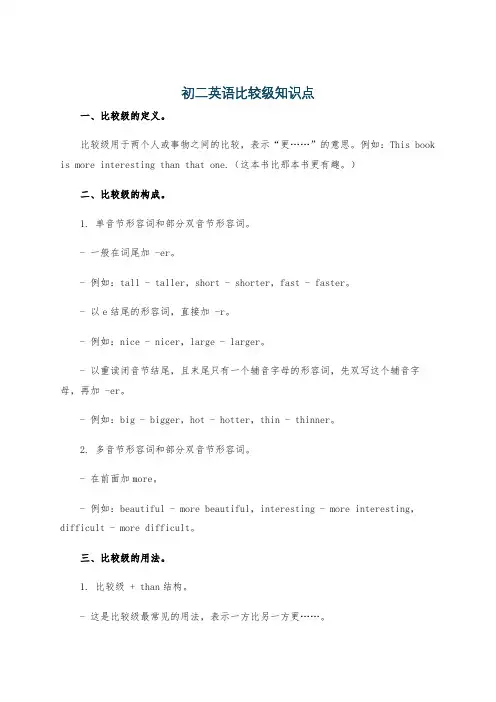
初二英语比较级知识点一、比较级的定义。
比较级用于两个人或事物之间的比较,表示“更……”的意思。
例如:This book is more interesting than that one.(这本书比那本书更有趣。
)二、比较级的构成。
1. 单音节形容词和部分双音节形容词。
- 一般在词尾加 -er。
- 例如:tall - taller,short - shorter,fast - faster。
- 以e结尾的形容词,直接加 -r。
- 例如:nice - nicer,large - larger。
- 以重读闭音节结尾,且末尾只有一个辅音字母的形容词,先双写这个辅音字母,再加 -er。
- 例如:big - bigger,hot - hotter,thin - thinner。
2. 多音节形容词和部分双音节形容词。
- 在前面加more。
- 例如:beautiful - more beautiful,interesting - more interesting,difficult - more difficult。
三、比较级的用法。
1. 比较级 + than结构。
- 这是比较级最常见的用法,表示一方比另一方更……。
- 例如:He is taller than me.(他比我高。
)- 在这个结构中,than后面可以接名词、代词(主格或宾格)、动名词或从句等。
- 例如:My mother gets up earlier than my father (does).(我妈妈比我爸爸起床早。
)- She runs faster than running in the rain.(她在正常情况下跑得比在雨中跑快。
)2. 比较级的特殊用法。
- “the+比较级,the+比较级”结构。
- 表示“越……,就越……”。
- 例如:The more you eat, the fatter you will be.(你吃得越多,就会越胖。
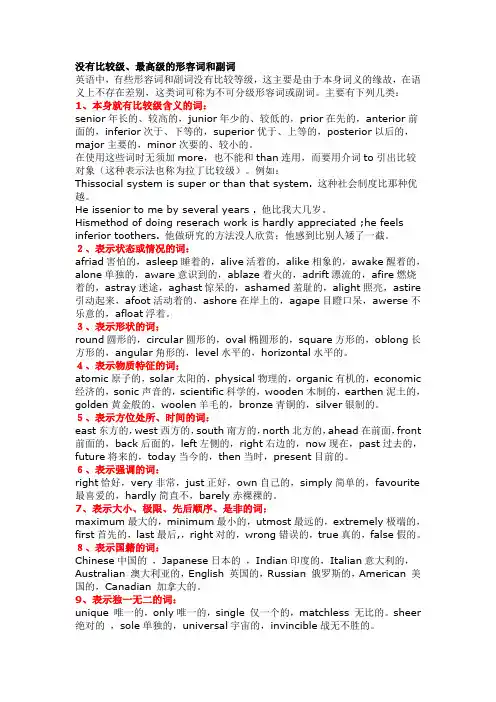
没有比较级、最高级的形容词和副词英语中,有些形容词和副词没有比较等级,这主要是由于本身词义的缘故,在语义上不存在差别,这类词可称为不可分级形容词或副词。
主要有下列几类:1、本身就有比较级含义的词:senior年长的、较高的,junior年少的、较低的,prior在先的,anterior前面的,inferior次于、下等的,superior优于、上等的,posterior以后的,major主要的,minor次要的、较小的。
在使用这些词时无须加more,也不能和than连用,而要用介词to引出比较对象(这种表示法也称为拉丁比较级)。
例如:Thissocial system is super or than that system. 这种社会制度比那种优越。
He issenior to me by several years . 他比我大几岁。
Hismethod of doing reserach work is hardly appreciated ;he feels inferior toothers. 他做研究的方法没人欣赏;他感到比别人矮了一截。
2、表示状态或情况的词:afriad害怕的,asleep睡着的,alive活着的,alike相象的,awake醒着的,alone单独的,aware意识到的,ablaze着火的,adrift漂流的,afire燃烧着的,astray迷途,aghast惊呆的,ashamed羞耻的,alight照亮,astire 引动起来,afoot活动着的,ashore在岸上的,agape目瞪口呆,awerse不乐意的,afloat浮着。
3、表示形状的词;round圆形的,circular圆形的,oval椭圆形的,square方形的,oblong长方形的,angular角形的,level水平的,horizontal水平的。
4、表示物质特征的词;atomic原子的,solar太阳的,physical物理的,organic有机的,economic 经济的,sonic声音的,scientific科学的,wooden木制的,earthen泥土的,golden黄金般的,woolen羊毛的,bronze青铜的,silver银制的。
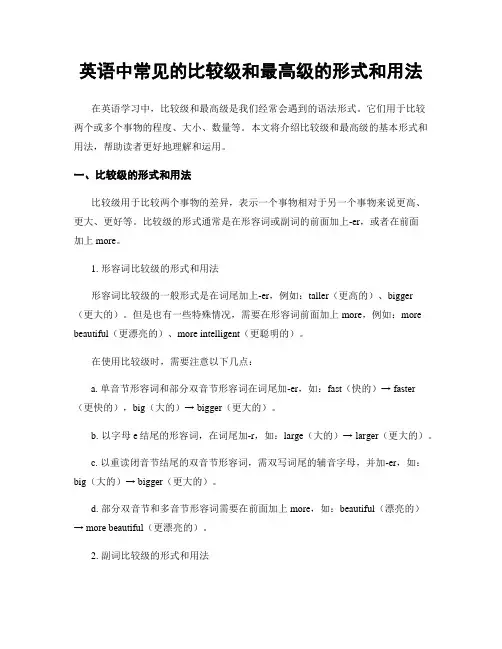
英语中常见的比较级和最高级的形式和用法在英语学习中,比较级和最高级是我们经常会遇到的语法形式。
它们用于比较两个或多个事物的程度、大小、数量等。
本文将介绍比较级和最高级的基本形式和用法,帮助读者更好地理解和运用。
一、比较级的形式和用法比较级用于比较两个事物的差异,表示一个事物相对于另一个事物来说更高、更大、更好等。
比较级的形式通常是在形容词或副词的前面加上-er,或者在前面加上more。
1. 形容词比较级的形式和用法形容词比较级的一般形式是在词尾加上-er,例如:taller(更高的)、bigger(更大的)。
但是也有一些特殊情况,需要在形容词前面加上more,例如:more beautiful(更漂亮的)、more intelligent(更聪明的)。
在使用比较级时,需要注意以下几点:a. 单音节形容词和部分双音节形容词在词尾加-er,如:fast(快的)→ faster(更快的),big(大的)→ bigger(更大的)。
b. 以字母e结尾的形容词,在词尾加-r,如:large(大的)→ larger(更大的)。
c. 以重读闭音节结尾的双音节形容词,需双写词尾的辅音字母,并加-er,如:big(大的)→ bigger(更大的)。
d. 部分双音节和多音节形容词需要在前面加上more,如:beautiful(漂亮的)→ more beautiful(更漂亮的)。
2. 副词比较级的形式和用法副词比较级的形式通常是在词尾加上-er,例如:faster(更快地)、earlier(更早地)。
与形容词不同的是,大部分副词比较级的形式都是在词尾加-er。
在使用副词比较级时,需要注意以下几点:a. 以字母e结尾的副词,在词尾加-r,如:late(晚地)→ later(更晚地)。
b. 以辅音字母+y结尾的副词,需将y改为i,并加-er,如:easy(容易地)→ easier(更容易地)。
c. 部分副词比较级形式不规则,如:well(好地)→ better(更好地)。
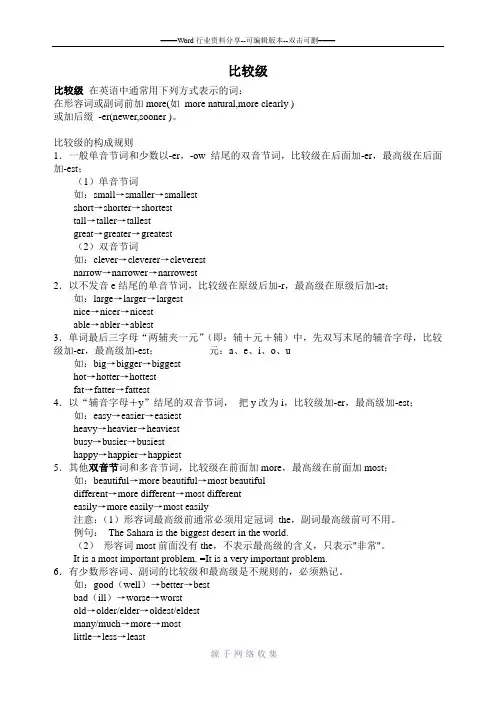
比较级比较级在英语中通常用下列方式表示的词:在形容词或副词前加more(如more natural,more clearly )或加后缀-er(newer,sooner )。
比较级的构成规则1.一般单音节词和少数以-er,-ow结尾的双音节词,比较级在后面加-er,最高级在后面加-est;(1)单音节词如:small→smaller→smallestshort→shorter→shortesttall→taller→tallestgreat→greater→greatest(2)双音节词如:clever→cleverer→cleverestnarrow→narrower→narrowest2.以不发音e结尾的单音节词,比较级在原级后加-r,最高级在原级后加-st;如:large→larger→largestnice→nicer→nicestable→abler→ablest3.单词最后三字母“两辅夹一元”(即:辅+元+辅)中,先双写末尾的辅音字母,比较级加-er,最高级加-est;元:a、e、i、o、u如:big→bigger→biggesthot→hotter→hottestfat→fatter→fattest4.以“辅音字母+y”结尾的双音节词,把y改为i,比较级加-er,最高级加-est;如:easy→easier→easiestheavy→heavier→heaviestbusy→busier→busiesthappy→happier→happiest5.其他双音节词和多音节词,比较级在前面加more,最高级在前面加most;如:beautiful→more beautiful→most beautifuldifferent→more different→most differenteasily→more easily→most easily注意:(1)形容词最高级前通常必须用定冠词the,副词最高级前可不用。
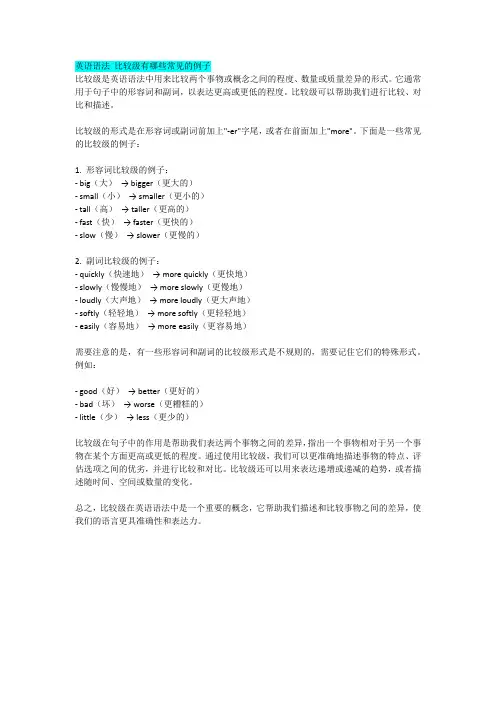
英语语法比较级有哪些常见的例子比较级是英语语法中用来比较两个事物或概念之间的程度、数量或质量差异的形式。
它通常用于句子中的形容词和副词,以表达更高或更低的程度。
比较级可以帮助我们进行比较、对比和描述。
比较级的形式是在形容词或副词前加上"-er"字尾,或者在前面加上"more"。
下面是一些常见的比较级的例子:1. 形容词比较级的例子:- big(大)→ bigger(更大的)- small(小)→ smaller(更小的)- tall(高)→ taller(更高的)- fast(快)→ faster(更快的)- slow(慢)→ slower(更慢的)2. 副词比较级的例子:- quickly(快速地)→ more quickly(更快地)- slowly(慢慢地)→ more slowly(更慢地)- loudly(大声地)→ more loudly(更大声地)- softly(轻轻地)→ more softly(更轻轻地)- easily(容易地)→ more easily(更容易地)需要注意的是,有一些形容词和副词的比较级形式是不规则的,需要记住它们的特殊形式。
例如:- good(好)→ better(更好的)- bad(坏)→ worse(更糟糕的)- little(少)→ less(更少的)比较级在句子中的作用是帮助我们表达两个事物之间的差异,指出一个事物相对于另一个事物在某个方面更高或更低的程度。
通过使用比较级,我们可以更准确地描述事物的特点、评估选项之间的优劣,并进行比较和对比。
比较级还可以用来表达递增或递减的趋势,或者描述随时间、空间或数量的变化。
总之,比较级在英语语法中是一个重要的概念,它帮助我们描述和比较事物之间的差异,使我们的语言更具准确性和表达力。
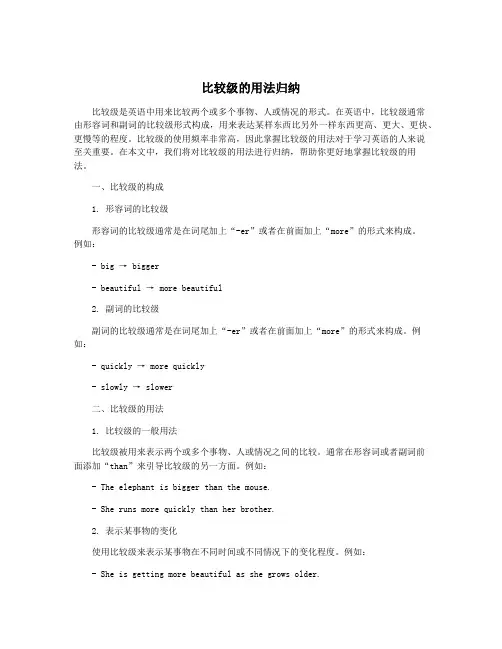
比较级的用法归纳比较级是英语中用来比较两个或多个事物、人或情况的形式。
在英语中,比较级通常由形容词和副词的比较级形式构成,用来表达某样东西比另外一样东西更高、更大、更快、更慢等的程度。
比较级的使用频率非常高,因此掌握比较级的用法对于学习英语的人来说至关重要。
在本文中,我们将对比较级的用法进行归纳,帮助你更好地掌握比较级的用法。
一、比较级的构成1. 形容词的比较级形容词的比较级通常是在词尾加上“-er”或者在前面加上“more”的形式来构成。
例如:- big → bigger- beautiful → more beautiful2. 副词的比较级副词的比较级通常是在词尾加上“-er”或者在前面加上“more”的形式来构成。
例如:- quickly → more quickly- slowly → slower二、比较级的用法1. 比较级的一般用法比较级被用来表示两个或多个事物、人或情况之间的比较。
通常在形容词或者副词前面添加“than”来引导比较级的另一方面。
例如:- The elephant is bigger than the mouse.- She runs more quickly than her brother.2. 表示某事物的变化使用比较级来表示某事物在不同时间或不同情况下的变化程度。
例如:- She is getting more beautiful as she grows older.- The traffic is getting worse as the day goes on.3. 表示程度的增加或减少比较级也可以用来表示程度的增加或减少。
例如:- The weather is getting colder and colder.- My English is becoming better with more practice.4. 表示对比比较级也可以用来表示对比,强调某一个事物相对另一个事物的不同之处。
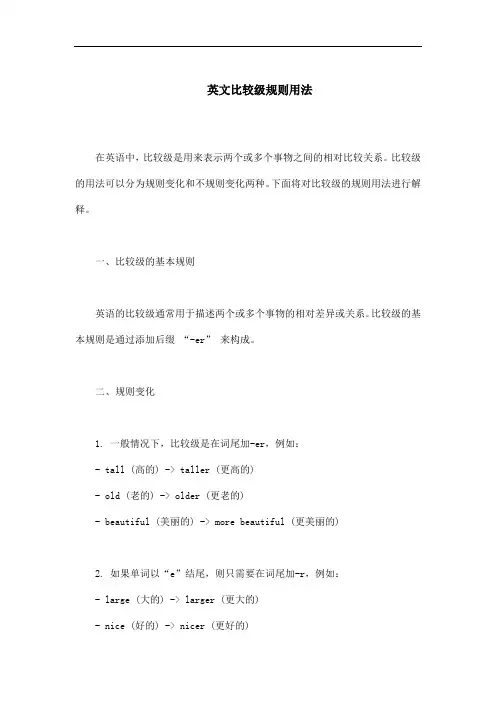
英文比较级规则用法在英语中,比较级是用来表示两个或多个事物之间的相对比较关系。
比较级的用法可以分为规则变化和不规则变化两种。
下面将对比较级的规则用法进行解释。
一、比较级的基本规则英语的比较级通常用于描述两个或多个事物的相对差异或关系。
比较级的基本规则是通过添加后缀“-er”来构成。
二、规则变化1. 一般情况下,比较级是在词尾加-er,例如:- tall (高的) -> taller (更高的)- old (老的) -> older (更老的)- beautiful (美丽的) -> more beautiful (更美丽的)2. 如果单词以“e”结尾,则只需要在词尾加-r,例如:- large (大的) -> larger (更大的)- nice (好的) -> nicer (更好的)3. 如果单词以“y”结尾,则可以将“y”变为“i”,再加-er,例如:- happy (快乐的) -> happier (更快乐的)- sorry (对不起的) -> sorrier (更对不起的)4. 如果单词以“th”结尾,则可以将“th”变为“er”,例如:- healthy (健康的) -> healthier (更健康的)- wealthy (富有的) -> wealthier (更富有的)三、不规则变化1. 一些常用的不规则变化的比较级包括:- good (好的) -> better (更好的)- bad (坏的) -> worse (更坏的)- far (远的) -> further (更远的)/farther (更远地)- much/many (很多地) -> more (更多地)2. 一些特殊的不规则变化包括:- well (好地) -> better (更好地)- ill (生病地) -> worse (更生病地)- little (少的) -> less (更少的)- many/much 的比较级是 more,但是 little 的比较级是 less。
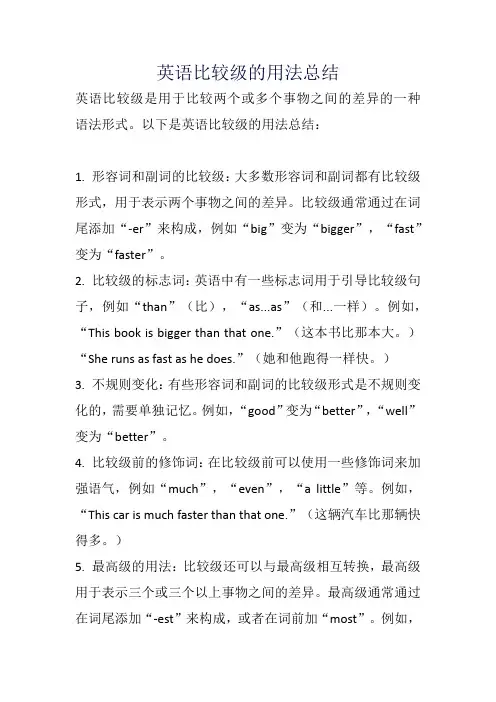
英语比较级的用法总结英语比较级是用于比较两个或多个事物之间的差异的一种语法形式。
以下是英语比较级的用法总结:1. 形容词和副词的比较级:大多数形容词和副词都有比较级形式,用于表示两个事物之间的差异。
比较级通常通过在词尾添加“-er”来构成,例如“big”变为“bigger”,“fast”变为“faster”。
2. 比较级的标志词:英语中有一些标志词用于引导比较级句子,例如“than”(比),“as...as”(和...一样)。
例如,“This book is bigger than that one.”(这本书比那本大。
)“She runs as fast as he does.”(她和他跑得一样快。
)3. 不规则变化:有些形容词和副词的比较级形式是不规则变化的,需要单独记忆。
例如,“good”变为“better”,“well”变为“better”。
4. 比较级前的修饰词:在比较级前可以使用一些修饰词来加强语气,例如“much”,“even”,“a little”等。
例如,“This car is much faster than that one.”(这辆汽车比那辆快得多。
)5. 最高级的用法:比较级还可以与最高级相互转换,最高级用于表示三个或三个以上事物之间的差异。
最高级通常通过在词尾添加“-est”来构成,或者在词前加“most”。
例如,“This is the biggest apple of the three.”(这是三个苹果中最大的一个。
)在使用比较级时,还需要注意以下几点:* 确保比较的对象是可数的,并且在使用“than”进行比较时,两个比较对象要保持一致。
* 注意一些特定的形容词和副词没有比较级和最高级形式,如“absolute”,“perfect”等。
* 在使用比较级构成句子时,要注意语序和语法的正确性。
以上是关于英语比较级的用法总结,希望能对你有所帮助。
英语比较级定义
比较级(Comparative Degree )在英语中通常用下列方式表示的词:在形容词或副词前加more(如more natural,more clearly )或加后缀-er(newer,sooner ).典型的是指形容词或副词所表示的质、量或关系的增加.英语句子中,将比较两个主体的方法叫做“比较句型”.其中,像“A比B更……”的表达方式称为比较级.组成句子的方式是将形容词或副词变化成比较级的形态.
表示"比...更",用比较级形容词+than+比较成分,than后主词的述语动词往往省略,非正式用法的than后的人称代名词可用受格.
【例句】
He is much younger than me.
他比我年轻多了.
构成
⒈单音节形容词和部分双音节词,一般在词尾加-er.
2.以字母e结尾的词,在词尾加-r.
3.重读闭音节词词尾只有一个辅音字母时,先双写该辅音字母,再加er.
4.以"辅音字母+y“结尾的双音节词,先把”y“改为”i“,再加-er.
5.多音节词和部分双音节词,在词前加”more“.
6.部分形容词和副词的比较级是不规则的,如:good/well-better,bad/badly-worse.
7.由“动词+后缀-ing/-ed”构成的形容词,在词前加more构成比较级.如:interesting-more interesting,bored-more bored.
8.由“形容词+后缀-ly”构成的副词,在该副词前加more构成比较级.如:slowly-more slowly,happily- more happily.。
(完整版)英语单词比较级英语比较级是英语语法中的一个重要部分,用于比较两个或多个事物的性质、程度或数量。
比较级通常由原级(即单词的基本形式)加上后缀er或more构成。
下面是一些常见的英语单词比较级:1. 形容词比较级(1)规则变化大多数形容词的比较级通过在原级后加上er构成。
例如:tall taller(高的)small smaller(小的)hot hotter(热的)cold colder(冷的)happy happier(快乐的)sad sadder(悲伤的)(2)不规则变化一些形容词的比较级是不规则的,需要特别记忆。
例如:bad worse(坏的)many more(许多的)much more(大量的)little less(少的)few fewer(少数的)2. 副词比较级副词的比较级通常在原级后加上er构成。
例如:fast faster(快地)slowly more slowly(慢地)carefully more carefully(仔细地)well better(好地)badly worse(坏地)3. 比较级的用法(1)形容词和副词的比较级通常与than连用,构成比较句。
例如:He is taller than me.(他比我高。
)She runs faster than him.(她比他跑得快。
)(2)在比较级前可以使用一些修饰词,如a little, much, far 等,表示比较的程度。
例如:This book is a little more interesting than that one.(这本书比那本更有趣。
)She sings much better than her sister.(她唱歌比她姐姐唱得好多了。
)She is the tallest girl in our class.(她是我们班最高的女孩。
)He runs the fastest in our school.(他是我们学校跑得最快的。
英语语法比较级在句子中的作用是什么比较级(Comparative Degree)是形容词和副词的一种形式,用于比较两个或多个事物的程度、性质或特征。
它用来表示一个事物在某方面相对于另一个事物更高、更低、更好、更坏等的程度。
比较级在句子中有多种作用,下面将详细介绍。
1. 比较两个事物的程度:比较级用来比较两个事物在某个方面的程度。
例如:- My car is faster than yours.(我的车比你的车快。
)- She is taller than her sister.(她比她姐姐高。
)2. 表示递增或递减:比较级可以用来表示递增或递减的变化。
例如:- The weather is getting colder.(天气越来越冷。
)- He is becoming more confident.(他越来越自信。
)3. 表示选择或偏好:比较级可以用来表示对两个或多个选项的偏好或选择。
例如:- I prefer tea to coffee.(我更喜欢茶而不是咖啡。
)- She likes apples better than oranges.(她比起橙子更喜欢苹果。
)4. 表示对比或对照:比较级可以用来进行对比或对照,突出不同之处。
例如:- The first book was good, but the second one is even better.(第一本书很好,但第二本书更好。
)- He worked hard, but his brother worked harder.(他很努力工作,但他哥哥更加努力。
)5. 强调差异或特征:比较级可以用来强调两个事物之间的差异或特征。
例如:- The blue dress is prettier than the red one.(蓝色的裙子比红色的漂亮。
)- This laptop is lighter and thinner than the old one.(这台笔记本电脑比旧的轻薄。
英语比较级和最高级的用法归纳一、英语比较级和最高级的概念英语比较级和最高级是形容词和副词的两种形式,用于比较两个或多个人、事物、属性等的差异。
比较级表示两者之间的差异,最高级则表示三者或三者以上中最高者的差异。
比较级和最高级通常用于描述有序等级的内容,如大小、重量、速度、价值等。
在日常生活中,我们经常使用比较级和最高级来进行比较和衡量,比如:"这个苹果比那个苹果更甜" "这是最好的饭店"等等。
二、英语比较级和最高级的形式1. 比较级的形式比较级的形式有两种:加-er 或在词前加more,例如:1) tall - taller2) beautiful - more beautiful3) interesting - more interesting这些比较级的形式引导比较短语,其中形容词或副词后面必须有一个than 的介词短语,例如:1) He is taller than his brother.2) This book is more interesting than that one.3) The weather is getting colder than yesterday.2. 最高级的形式最高级的形式与比较级的形式相似,但是最高级是加-est 或在词前加most,例如:1) tall - tallest2) beautiful - most beautiful3) interesting - most interesting这些最高级的形式引导最高级短语,其中形容词或副词后面必须有冠词"the" ,或指定的名词,例如:1) He is the tallest boy in his class.2) This is the most interesting book I have ever read.3) The weather is the coldest this winter.三、英语比较级和最高级的用法1. 表示相对高低英语比较级和最高级的最常见用途是表示相对高低。
英语中的比较级和最高级在学习英语的过程中,我们经常会遇到比较级和最高级这两个语法概念。
比较级和最高级是用来比较两个或多个事物之间的差异和优劣的。
掌握比较级和最高级的用法,可以帮助我们更准确地表达自己的意思,丰富我们的语言表达能力。
一、比较级比较级用于比较两个事物之间的差异,表示一个事物相对于另一个事物在某个方面的程度更高或更低。
在构成比较级时,一般在形容词和副词的前面加上“-er”,或在词前加上“more”。
例如,我们可以说:“She is taller than her sister.”(她比她妹妹高。
)在这个句子中,“taller”就是比较级形式,表示“高”的程度比“她妹妹”更高。
除了形容词和副词,一些不规则的形容词和副词也有特殊的比较级形式。
例如,“good”(好)的比较级是“better”(更好),“bad”(坏)的比较级是“worse”(更坏)。
比较级还可以用于表示两个事物之间的相似程度。
例如,“He is as tall as his brother.”(他和他兄弟一样高。
)在这个句子中,“as tall as”表示两者的身高相同。
二、最高级最高级用于比较三个或三个以上的事物,表示其中一个事物在某个方面的程度是最高的。
在构成最高级时,一般在形容词和副词的前面加上“-est”,或在词前加上“most”。
例如,我们可以说:“He is the tallest boy in the class.”(他是班里最高的男孩。
)在这个句子中,“the tallest”就是最高级形式,表示“高”的程度在班级里是最高的。
和比较级一样,一些不规则的形容词和副词也有特殊的最高级形式。
例如,“good”(好)的最高级是“best”(最好),“bad”(坏)的最高级是“worst”(最坏)。
最高级还可以用于表示三个或三个以上事物之间的相似程度。
例如,“He is one of the tallest boys in the class.”(他是班级里最高的男孩之一。
比较级(comparative degree)在比较级中,有超越、相等、差逊三个级别。
1. 超越(superiority)(1)better than: 胜过,优于Doing is better than saying.(百说不如一做。
)(2)more than + 从句。
多余,超过She has talked more than what is necessary.(她说了一些多余的话)(3)“than +关系代词”的从句。
再…… 不过。
He is a scholar than whom no man ever will be more honest.(他是个再诚实不过的学者了。
)(4)superior to :占优势,比……胜一筹。
He is superior to his elder brother.(他比他哥哥强)2. 相等(equality)(1) as …as. 如……一样。
As busy as a bee. ( 忙得不可开交)(2) as well as 。
既…… 又,和……一样。
Pompey, as well as Caesar, was a great man.(像恺撒一样,庞培也是一位伟人。
)(3) the same as…. 像……一样。
The same as the past. (一如从前。
)(4) such/ so…as. 像……一样。
Such a great poet as Homer was proficient not just in literature but also in history .(像荷马那样的诗人,不仅要精通文学,还要精通历史。
)(5) no sooner than.. 一……就(几乎同时,夸张用法)。
No sooner said than done.(说到做到。
)(6) No more than. 就像,不优于。
You’re no more capable of speaking French than I am.(你我都不会说日语。
比较句型As /so ... as ...结构︰as/so+形容词或副词原级+as…说明︰此句型意为“…和…一样…”。
比较两件东西,并表示它们的程度一样。
第一个as 为<副词>,第二个as 则为<副词><连接词>,引导<副词子句>,修饰第一个as。
在as…as 中可插入单数<可数名词>,即:“as+<形容词>+a/an+<名词>+as”。
若是复数<名词>,可用“as many/few+复数<名词>+as”;若是<不可数名词>,则用“as much/little+<不可数名词>+as”。
“as+原级(形、副)+as+原级(形、副)”这形式表示有关同一人(物)的两种不同的性质、状态是一样程度的,译作“既有…且还有…”。
he is as handsome as his brother (is). 他和他哥哥一样英俊。
judy goes to the movies as often as Sara does. 朱迪像莎拉一样时常去看电影。
old john goes to sleep as easily as a baby does. 老约翰像婴儿一样容易入睡。
the girls are as busy with their work as bees. 这些女孩子就跟蜜蜂一样忙着工作。
he is as nice a boy as peter (is). 他和彼得一样都是好男孩。
she has as many friends as mary (does). 她和玛丽一样有许多朋友。
he has as much money as john (does). 他和约翰一样有很多钱。
he is as clever as (he is) handsome. 他不但英俊而且聪明。
my teacher is as kind as (she is) intelligent. 我的老师不但善良而且聪慧。
as many/much ...结构︰as many/much+名词…说明︰此句型意为“同数(量)的…;一样多”。
本<词组>旨在用以代替句中前面已提到的相同数字,以避免该数字的重复。
he was tired enough to make ten errors in as many (=in ten) pages.他疲倦得十页中犯了十个错误。
mike read five books in as many (=in five) months. 麦克在五个月内看了五本书。
i didn’t expect that he should have committed three robberies in as many days.没想到(老实的)他居然在三天内犯了三次抢劫罪。
as many/much as ...结构︰as many/much as+数字+复数名词/不可数名词说明︰此句型意为“多达…”。
不要与“as many/much+<名词>”(同数量的…)混淆。
同理,此类<词组>还有:as long as+数字+<名词>(长达…),as wide as+数字+<名词>(宽达…),as high as+数字+<名词>(高达…),as early as+数字+<名词>(早在…),as late as+数字+<名词>(迟在…)等。
she has as many as seven sisters. 她的姊妹有七人之多。
as many as 100 people were killed in the air crash. 这次空难中多达一百人丧生。
i gave the beggar as much as 1,000 yen. 我给了这乞丐整整一千元。
building costs ran up to as much as nt$ 20 million. 建筑费用涨到高达新台币两千万。
i have been learning english (for) as long as 15 years. 我学英文已有十五年之久。
he came home as late as two in the morning. 他迟至清晨两点才回家。
i saw your brother as late as last week. 上个礼拜我还看到你哥哥。
the river is as wide as 100 meters. 这条河宽达一百公尺。
i mailed the letter as early as friday. 我早在星期五就把信寄了。
a is as much + n + asb is结构︰主词+be+as+much+名词+as+(be)+主词说明︰此句型意为“…和…同样…”。
“as much+<名词>+as+(be)+<主词>”的be 通常省略或放句末。
comets are just as much members of the sun’s family as (are) the other planets.彗星和其它的行星同样是太阳家族的成员。
to eat too much is as much a bad thing as to eat nothing.吃太多和什么都不吃同样是坏事。
he is as much a member of the orchestra as tom. 他和汤姆同样是管弦乐队的成员。
not as/so + adj/adv + as + n结构︰not as/so+形容词/副词+as+名词说明︰此句型意为“不像…那样…”。
as…as 可用于肯定句或<否定句>,而so…as 仅可用于<否定句>构中。
it is not as (so) popular as other foods. 它不像其它食物那样受欢迎。
he does not study as (so) hard as john. 他不像约翰那样用功。
i am not as (so) careful as tom. 我不像汤姆那样细心。
as far as ...结构︰as far as+名词说明︰此句型意为“到…之远;到…的程度”。
而“as far as+<主词>+<动词>”则表示“只要…,在…范围内的话…”。
Swallows from england go as far as south africa. 英国来的燕子飞到南非那样远的地方。
we walked as far as the railroad station. 我们走到火车站那样远的地方。
we drove as far south as kaohsiung. 我们往南开车一直到高雄。
he went as far as yokohama to meet his friend from england.他远至横滨去迎接由英国来的朋友。
i swam as far as i could. 我尽可能地游远。
... just as ... as ...结构︰主词+动词+just as+形容词/副词+as+(代)名词/动名词说明︰此句型意为“…就像…一样…”。
第一个as 是“同样的;一样的”,第二个as 是“像”之意。
若<主词>之后不是be <动词>,则as 之后不用<形容词>,而要用<副词>。
being a good pedestrian is just as important as being a good driver.做一个好的行人就像做一个好的司机一样重要。
writing is just as important as reading. 写作就像阅读一样重要。
he wrote just as carefully as tom. 他就像汤姆一样小心地写。
... as ... as one can结构︰…as+形容词/副词/名词+as one can说明︰此句型意为“尽可能…”。
“as ... as one can”相当于“as ... as possible”。
one 要随<主词>的人称而变化,而can 要随<时态>变化。
to speak english fluently, you had better read as many english articles as you can.要想把英文讲得很流利,你最好尽量多看英文文章。
take as much exercise as you can. 尽可能多做运动。
be as careful as you can. 尽可能小心。
our teacher explained the lesson to us as clearly as he could.我们的老师尽可能清楚地为我们解释这一课。
she needed to soften her request to make it as polite and courteous as she could.她需要使请求语气柔婉,以便尽可能把它变成有礼貌与客气。
you should be as careful as you can in making friends.在交朋友方面,你应该尽可能小心。
we had better learn by heart as many sentence patterns as we can.我们最好尽可能多背句型。
i looked down the road as far as i could. 我尽可能遥望这条路。
i will try to save as much as i can. 我会设法尽可能多储蓄。
you should remain as quiet as you can. 你应尽可能地保持沉默。
... as ... as ... can be结构︰主词+be 动词+as+形容词+as+(形容词)+can be说明︰此句型意为“极…,不亚于任何人…”。
此<句型>借重复同一个<形容词>而成为强调此<形容词>的说法。
常用的此类<词组>有:as plain as plain can be(再明白不过了),as wise as wise can be(再聪明不过了),as white as white can be(白得不能再白了),as wrong as wrong can be(错得太离谱)等。